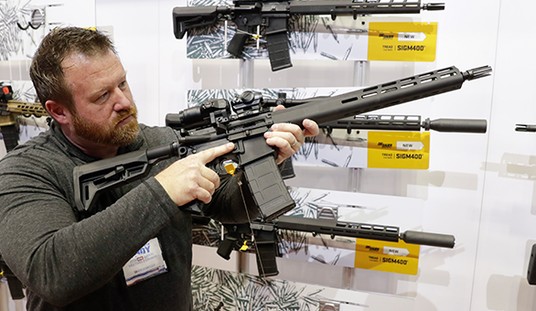A 22-year-old man on probation for a knifepoint robbery at a D.C. Metro station is now accused of a carjacking and shooting spree in Prince George’s County, Maryland and the District of Columbia, and the suspect’s previous criminal history raises some major questions about why the Department of Justice chose to dismiss a charge of felon-in-possession just last year.
According to Prince George’s police, 22-year-old Daeyon Ross first carjacked a small SUV in Capitol Heights, Maryland; pointing a gun at the driver before taking off behind wheel, only to crash the stolen vehicle a few blocks away.
Police say Ross then attempted to carjack an Acura ILX in the drive-thru lane of a McDonald’s on Ritchie Road. When the driver, [56-year-old Kurt] Modeste, tried to get away, Ross allegedly shot him multiple times. Modeste managed to drive a short distance before he was pronounced dead.
Ross then carjacked a Toyota Scion, also in the drive-thru, that had three dogs inside. Police said he killed two of the dogs, before driving away in the Scion heading westbound on Central Avenue.
Officers from several agencies followed Ross, as he crossed into D.C. At the intersection of 52nd Street and Sheriff Road NE, he got out of the Scion and carjacked a fourth victim, stealing a GMC Terrain, but got into another crash. When officers approached Ross at the crash scene, an officer with the Capitol Heights Police Department fired shots, but neither the officer nor Ross was injured.
“It’s extremely rare to come across an individual who has such a disregard for life,” said Acting Deputy Chief Zachary O’Lare of the Prince George’s County Police Department.
And yet, authorities have come across Ross on several occasions over the past few years. In 2017 Ross was convicted as a juvenile for an armed robbery and according to WUSA-TV served five years in juvenile custody before he was released last year. Shortly after, and while he was still on probation for that earlier crime, D.C. police caught Ross with a pistol, only to see the resulting charges dropped by the U.S. Attorney’s office.
D.C. Superior Court records show Ross was arrested on Aug. 11, 2022 on multiple charges for allegedly carrying a handgun despite his felony conviction. According to an affidavit, Ross allegedly had a “wide-eyed stare” when he saw officers while walking in the 1400 block of Congress Place SE and then took off running while grabbing his waist band. Officers chased him, during which Ross allegedly pulled out a black handgun and threw it on the ground. Ross was taken into custody shortly thereafter and the gun was determined to be a Taurus G3 9mm with 13 rounds of ammunition.
Ross was charged with being a felon in possession, carrying a pistol without a license, possession of an unregistered firearm, possession of unregistered ammunition, altering identification marks of a weapon and possession of a large capacity ammunition feeding device. The U.S. Attorney’s Office for the District of Columbia dropped all of those charges two months later, however, after Ross’ public defender filed motions challenging the constitutionality of the search under the Fourth Amendment and of the charges under the Supreme Court’s landmark decision in New York State Rifle & Pistol Association, Inc. v. Bruen, which established a new “historical tradition” test for evaluating firearm regulations.
The U.S. Attorney’s office didn’t drop the charges because of the Bruen decision, even if that’s one of the reasons Ross’s public defender gave for why the case against their client should be dismissed. Biden’s DOJ contends that only “law-abiding citizens” have any right to keep and bear arms and have continued prosecuting prohibited persons cases even after the Bruen decision was handed down, so I don’t see how Bruen would have had any impact on the charging decision here.
Instead, as writer Matthew Yglesias recently highlighted, D.C. courts are throwing out a surprising number of prosecutions for firearm-related offenses on Fourth Amendment grounds; an issue that Ross’s public defender also raised last year. Yglesias pointed out a case decided in April called T.W. v. United States that seems to bear a close resemblance to the circumstances of Ross’s arrest. From the decision:
T.W. raised his hands in the air upon seeing the two officers exit the front vehicle. Ewing asked T.W. whether he had a gun on him, and T.W. responded no. Ewing and Gendelman continued approaching T.W. from each side, and Ewing asked “You sure?” to which T.W. replied, “Yeah, I’m positive.” Gendelman then asked, “I can pat you down just to make sure?” T.W. said “Yeah,” and Gendelman responded, “My man,” as he began to pat T.W. down. Gendelman found a gun in T.W.’s waistband. The encounter lasted about ten seconds from when the first officers exited their vehicle to when the pat-down search began, and it took just about another five seconds for the officers to find the gun on T.W. He was charged with carrying a pistol without a license, possession of an unregistered firearm, unlawful possession of ammunition, and possession of a large-capacity ammunition- feeding device.
Before trial, T.W. moved to suppress the gun, its magazine, and its ammunition. He argued that he was unlawfully seized in violation of the Fourth Amendment when he consented to a pat-down search, and that his consent was the fruit of the illegal seizure. During a hearing on his motion to suppress, T.W. testified that he was “scared and nervous,” never having been arrested before, and did not think he could say “no” to Gendelman’s pat-down request. Asked why not, T.W. responded, “Because of how they came up on me. I felt like I couldn’t walk away.” T.W. further highlighted his youth (21 years old at the time), his “complete lack of experience” with police, “and the fact that he was confronted by multiple officers” who “essentially jumped out on [him] and immediately began asking accusatory questions.”
As Yglesias points out, a jury convicted T.W. at trial, but the D.C. Court of Appeals reversed that conviction on the grounds that the tactics used by police violated T.W.’s Fourth Amendment rights.
Did the USAO believe that was likely going to be the end result of prosecuting Daeyon Ross for being a violent felon in illegal possession of a firearm? If so, it would indicate that this problem has been going on for quite some time in the District, given that Ross’s charges were dropped last year, and T.W.’s case was only reversed a few months ago.
So far the DOJ isn’t talking about why the U.S. Attorney made the decision to drop all of the gun charges Ross was facing last year, but I’m not sure that there’s an answer that’s going to be acceptable. A violent felon was allegedly found in possession of a loaded gun just a short time after being released from custody, and DOJ ultimately took a pass on providing any consequences for that crime. Less than a year later Ross is now charged with first-degree murder, armed carjacking, and even cruelty to animals for shooting two dogs in the second vehicle that he stole at gunpoint.
While Joe Biden is demanding new gun laws aimed at peaceable gun owners his own DOJ is turning down the chance to prosecute repeat offenders; something to keep in mind the next time the president calls for a gun ban, a crackdown on firearms manufacturers, or other infringements on our right to protect ourselves from the violent offenders the Department of Justice are letting go.









Join the conversation as a VIP Member